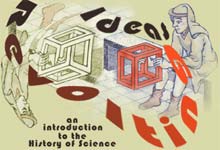
University of California, Irvine
Instructor: Dr. Barbara J. Becker

|
Week 8. Living Machines excerpts from
|
The full title of Mary Shelley's classic novel is Frankenstein: The Modern Prometheus (1817).
Why Prometheus?
We find, perhaps, one clue on the title page of the book which includes these lines from John Milton's Paradise Lost:
Did I request thee, Maker, from my clayIs Shelley's "Modern Prometheus" the Maker, or the Man?
To mould me man? Did I solicit thee
From darkness to promote me?
The name, Prometheus means "forethought" (from the Greek roots pro meaning "before" and methes meaning "thought"). Prometheus was a Titan. Long ago, the Titans ruled the universe. Their king, Cronus had six children--the Olympian gods: Zeus, Hera, Hades, Poseidon, Demeter, and Hestia. Led by Zeus, the gods revolted against their father and his tyranny. Two of the Titans--Oceanus and Prometheus--deserted Cronus and came to the aid of gods. Thanks to this assistance, the gods defeated the Titans and Zeus became the new ruler of the universe.
Prometheus created men and aided these helpless beings by giving them knowledge of all useful arts and inventions (medicine, agriculture, metallurgy). In time, Zeus became angered by men's evil ways and vowed to destroy them all. Prometheus, determined to protect and preserve his creations, stole the secret of fire from the gods and gave it to men. Zeus was furious. Rather than destroy mankind as he had originally planned, Zeus concocted an even more dreadful punishment for them: he introduced the first woman, Pandora, into the world of men! As for Prometheus, Zeus decreed that he should be bound to a rock, where, each day, for all eternity, a vulture would come to pluck out his liver, and each night, his liver would grow back again. Prometheus suffered in this way for thousands of years, until freed by Hercules.
The great Greek playwright, Aeschylus of Athens, lets Prometheus himself
recount his tragic tale in the play Prometheus Bound.
|
|